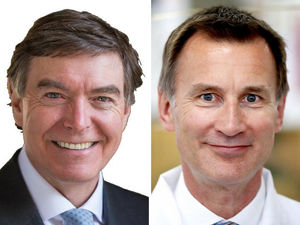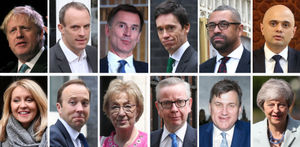MP Philip Dunne backs Jeremy Hunt for Tory leadership
A Shropshire MP has pledged his support for Jeremy Hunt to become the next Prime Minister, labelling him the "most impressive person" he has ever worked for.

Philip Dunne, the MP for Ludlow, also said Mr Hunt's background as an entrepreneur would give him a much-needed edge in the art of negotiations.
He said the former Health Secretary is the clear choice to lead the Conservative Party and will give the country "one last shot" at a negotiated exit from the EU.
Tory leadership explainer:
"European leaders know and trust Jeremy. He has spent the past year earning their respect as Foreign Secretary," said Mr Dunne.
"When it comes to detailed negotiations with the EU in the small hours, it will be these skills Britain most needs to bring to the table – a tough edge, backed by the right diplomatic touch, to get the best possible result for the UK."

Mr Dunne added: "I will be backing Jeremy Hunt to become the next Prime Minister, to unite the Party, all parts of the Union and the country.
"He will provide a positive Conservative vision to deliver a prosperous future for post-Brexit Britain that will both strengthen the economy and make a real difference in improving people's lives."
Mr Hunt now joins Boris Johnson, Dominic Raab, Rory Stewart, Esther McVey, Matt Hancock, Andrea Leadsom, Michael Gove, Sajid Javid, Kit Malthouse, Graham Brady and Penny Mordaunt in the race to be the next Prime Minister.
Hunt warns against sending ‘ultra hardliner’ to Brussels
Mr Dunne's backing comes as Mr Hunt insisted he would be more likely to succeed in Brexit negotiations with Brussels than an “ultra hardliner”.
The Foreign Secretary, who refused to commit to taking the UK out of the European Union on October 31, said Brussels would react with a tough stance of its own if faced with a hardline Brexiteer.
Meanwhile, leadership rival Matt Hancock distanced himself from Theresa May’s “no deal is better than a bad deal” mantra and insisted he would be “brutally honest” about the difficulties of the process.
Both Cabinet ministers said they wanted to replace the Northern Irish backstop with “alternative arrangements”, but did not give details about how this could be achieved.
Under the terms of the deal struck by Theresa May and the EU to delay Brexit until October 31, the Withdrawal Agreement cannot be renegotiated.
But Mr Hunt told ITV’s Peston that the EU would back down because they too wanted a deal.
“I think the EU don’t want the shadow of Brexit hanging over them, they want this issue solved.”
One of the problems faced by Mrs May was that the EU “lost faith that the British government would be able to deliver the British Parliament”, so Mr Hunt would have a negotiating team with representatives from the DUP and Tories from the European Research Group to ensure that any deal reached could get through the Commons.
“I don’t pretend it’s going to be easy,” he acknowledged, but said he believed a renegotiation could be achieved by October 31.
He has repeatedly warned that if the UK was facing a no-deal Brexit on October 31, Parliament would act to stop it and the prime minister would be forced to either seek another delay or call a general election – in which the Tories would be “wiped out”.
“I would challenge all of the candidates to say exactly where they stand on that because I think people need to know whether there is a risk of a general election in the next six months… I think that would be very, very devastating.”
He added: “I think what most people will be thinking is ‘who is most likely to deliver Brexit and deliver it quickly?’
“If we get the approach wrong, if you send an ultra hardliner to Brussels, you will get an ultra-hardline response. And then we will be faced with those very difficult choices.”
But rival candidate James Cleverly hit out at the prospect of the October 31 departure date being pushed back, saying “delay is the worst thing”.
He told Peston: “Delay brings indecision, the longer we have got to decide, the less decisive we are and we have got to get real, we’ve got to make the tough decision, we’ve got to make it soon.”
Mr Hancock said he is “not against” a no-deal Brexit but added: “It won’t happen because Parliament won’t allow it.”
The “best option” was to secure a deal and he told BBC’s Newsnight that would require the backstop – measures which keep the UK closely bound to EU trade rules to avoid a hard border with Ireland – to be replaced.
Asked what he could do differently to Mrs May, he said: “I’m being completely straightforward about the real trade-offs that exist.
“I haven’t started in this saying that ‘no deal is better than a bad deal’. I haven’t started from the point of view of saying that.
“I’ve started from the point of view of saying we’ve got to be brutally honest about the real constraints that will face the next prime minister, whoever they are.”
He said he would put “alternative arrangements” at the centre of his plan.
“The difference is that the alternative arrangements have not been at the forefront of the policy that was part of the deal put forward before.
“Instead the proposed future arrangements were to build on the backstop and that is materially different.”





